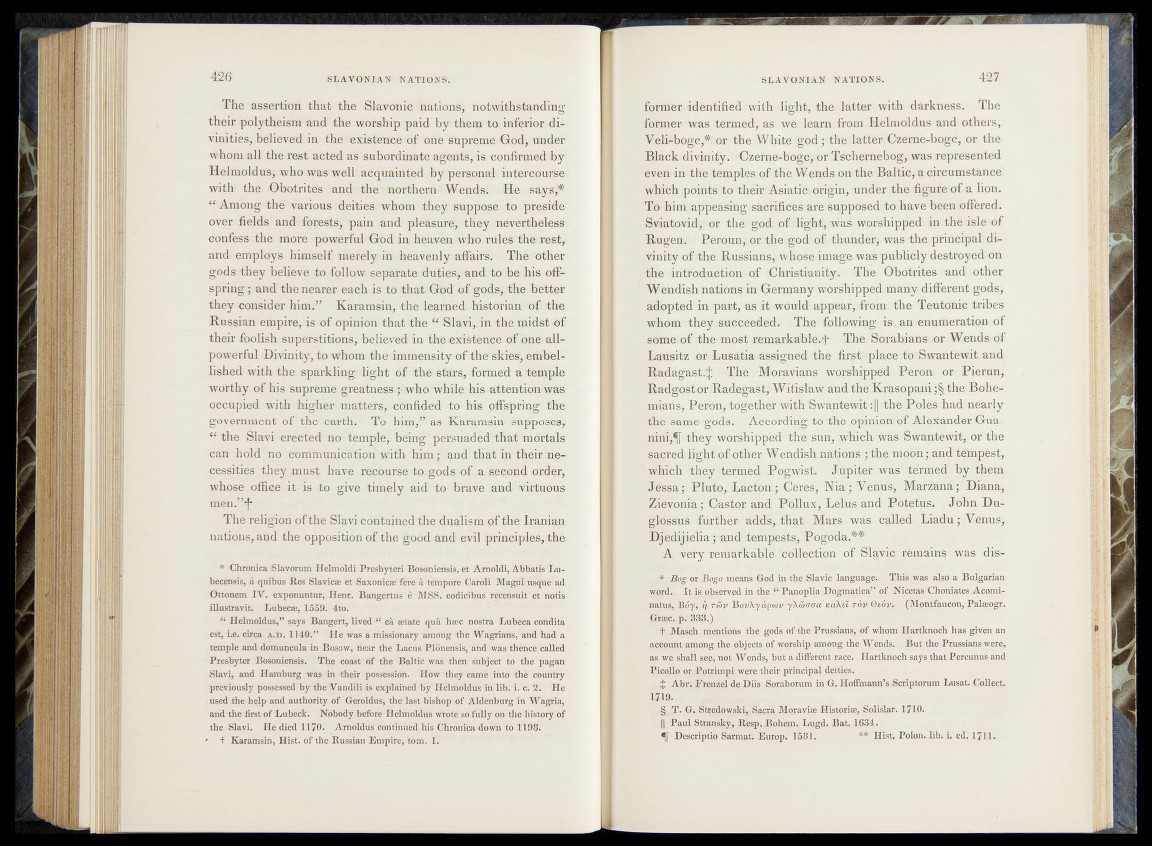
The assertion that the Slavonic hatidnsy notvrifhséandinÉl
their polytheism and' the worship paid- by. them to inferior dh-
vinities, believed in the existence of one süprêmeGod; under
whom all the rest acted ashsubordmute agents,ds confiriined^b^
Helimoldus, who warwelb;acquainted fey personal intercourse
with the Gbotrites and |the ■ inorthern Wends,■ He
“ Among the various , deities whom they supposeffto* preside!
over‘fields and forests, pain and pleasure, they ’nevertheless
confessithe more powerful God in heaven who rules'the resfy
and employs himself merely in heavenly -affairs’: Thedither
gods^fhey Kheveife follow separate duties, and to hehis ofP-
spring ; and the nearer each is to that God of gods, the- better
they*consider him/5 Karamsin, the learned historian of >thfe
Russian empire, is of opinion that the “ Slavi, in the paidj&t of
their foolish superstitions, believed in-the existehcevOf one all-
powerful Divinity, to whom th e immensity of th©--skie$,emfeel-
lished with the sparkling light 0^ ttm sÉirs,^hmefl a temple
worthy of his supreme greatness-^-who while his-attentï@rë was
qècupied with higher"matters, confided ^ his offspring* the
gaveinmenf offthe earth. Tó hiih^vlhs^'Kararasiiïi/stkppos^
the Slavi erected no temple, being persuaded that mortals
can hold no cemmunication with him; andffiat fri thérê necessities
they must have recourse' to gods off# second order,
whose office it is to give timely aid tobraveend virtuous
men.55*f-
The religion of the Slavi contaihediheTluali?ro off he Iranian
nations, and the opposition of the good and evil principles, the
- * Chronica filavorum Helmoldi Presbyteri Bosoniensis, et Amoldi, Abbatis Lu-
becensis, a quibus Res Slavics et iSaxonicasferea, tempore Caroli Magni usque ad
Ottonem IV. exponuntur, Henr. Bangertus è MSS. codicibus réöefisüit' et nods
illustravit. Lubecas, 1559. 4to.
" * Belmoldus,” says Bangert, lived,(( e h astute qu&,h*c nostra Lubeca coriflita
est, ije. circa a.d . 1149.” He was a missionary among the Wagrians, and 'had a
temple and .domuncula in Bosow, bear the Lacus Plönensis, and was thence called
Presbyter Bosoniensis. The coast of the Baltic was then subject to the pagan
rilavi, and Hamburg was in their -possession. How they came intö fhë country
previously possessed by fireVandili -is explained by'Helmoldus 'in Rb. i. c. 2. He
. used the fa§Lp and authority of Gereldus, the last bishop of Aldenburg in Wagria,
and the first of Lübeck. Nobody before Hehndldas wrote so fully on the history of
the Slavit He died H70; AmóldüAcontinued liis Chronifea-down to 1198.
' t Karamsin, Hist, of the Russian Empire, tom. 1.
former identified with light, the latter with darkness. The
former- was men learn from Helmoldas and others,
V e h -b o g c o r the White god; the latter Czerne-boge, or the
Black divinity«CjzeiSne^bogeyor Tschernefefeg, was represented
even in the temples^of fhe Wends on the Baltic, a circumstance
which points to dheir-Asiatit^t^giaifr under the figure of a lion.
To -him appeasing feacrifijcesare supposed to have been offered.
Sviatovid,-*. or the:god of light,»was worshipped in- the isle of
Rugen. Peroun, or the gfod,«ofhthundery .>was th e principal divinity
of itfie Russians, whose image, was publicly destroyed on
the introduction off ^Christianity. The Obottites and'other
Wendish'ftal-ions in Germany worshipped many different gods,
adbptM dnapaTt, as sit would appear; fio tn 'th e Teutonic tribes
whop they .succeeded. ,-iiDhe - following is an enumeration of
some of the-most,remarkable.^- The Serabians or Wends of
Lausitz or iLuiaKa-^signed the first place to Swantewit aud
R-add^iit'l^^ The ’Moravians worshipped”;. Peron or Piero«,
RadgosioriRadegast; Witisla-w andthe Krasopani;§ the Bohe^
m^ng^Perfir^ddgethehvrith=S’w a n t e w i th e Pole,s had nearly
the same- ^odsvVAdeording to the opinion') off Alexander Gua-
nirii,^[ they* worshipped the’-sfin, which was Swantewit, or the-
saoredjfeht ofotlier Wendisfrnations ;-the moon; and tempest,
'winch theysfekmed Pogwist. Jupiter was .termed * h y them
Ipssar; Pluto, Lactbn; Ceres, -Nia; Yenfil^ Marzana; Diana,
Z^yOma) Castor and Pollux^ Lelus aiid5 Botetusl John 3§np
yglossus further adds, that Mars was. called Liadu; Venus,
Dljedijieliaand teSlpests, Pogoda.*#
A very remarkable Vollect%i of Slavic Remains was dis-
< *. jg«g yt,J3oga means Gedin the.Sla-fic- language. g This was also a Bulgarian
wpjd. Ij Jja .observed in(tb,e “ Panoplia Dqgmataca” of Nicetas Choniates Acomi-
natus, -Boy, ij t m v lR o v \y a p< o v yXOnrtra ic a k ti rovjQjjjV*- (Montfaucon, Palseogr.
Grasc. p, 333.) . '
t Masch mentions the gods of the Prussians, of whom Hartknoch has given an
account among the objects of worship among the trends. But the Prussians were,
as we shall see, not Wends, a different race. Hartknoch says that Percunus and
Piocdl® QrriRajyitoLtik w#re th«ir principal deifies. •
■- 4: Abrf Erpuzel des.Diis Soraborum in G. Hoffmannls Scriptorum Lusat Collect.
1719.
BjEffiA Stredowskiv Sapra Morayi-ffi Histori®,.Solislar. 1710. .
, 1| Paul Stransky« Resp. Bohepi; t-*hgd. Bat. 1634..
•JJ Descriptio Sarmat. Europ.' 1581. ** Hist. Polon. lib. I edi 1711.